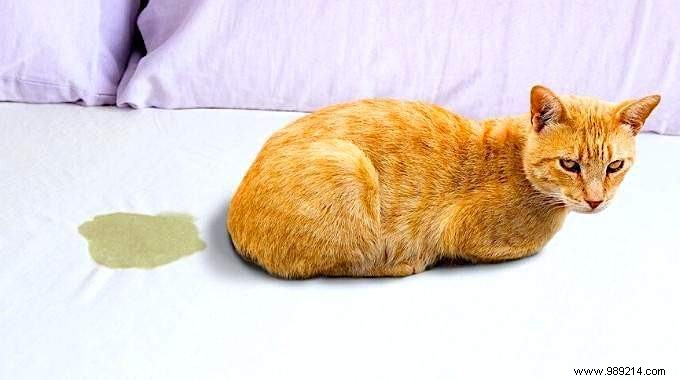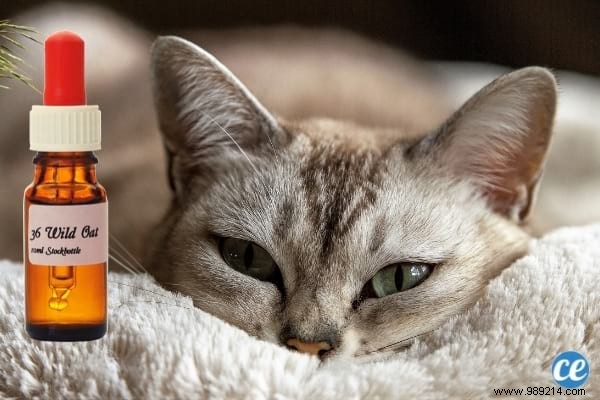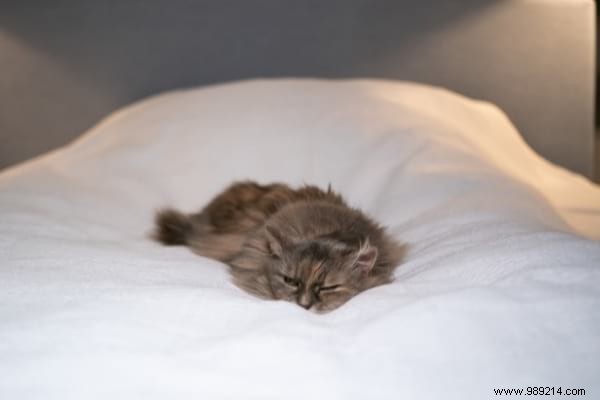
Does your cat tend to pee on your bed?
I show you here all the solutions to prevent your cat from defecating where you sleep.
Because it must be said that it is really unpleasant to discover cat pee on the bed or the sofa...
But why is he doing this for no apparent reason?
It is often a sign of stress or ill-being that will have to be identified.
With the help of my vet, I've listed 11 tips to help you understand why your cat is acting like this.
And how to avoid this behavior in cats.
Stress, illness, behavioral problems...
...Find out why your cat pees on your bed and my tips to avoid it . Watch:


The cat is a very clean animal, very delicate and maniacally haired.
He has his preferences in terms of small corner, and it will be necessary to respect them!
A clean litter box
First of all, make sure to offer him a clean litter box. Remove droppings at least once a day.
Change all the litter every week. Take the opportunity to clean the bin completely with this trick.
Mineral or vegetable litter
Every cat has their preferences. Some like pebbles, others wood chips or vegetable litter, still others like clumping litter.
Respect what he loves .
My cat hated plant litter. The time I made a mistake buying it, I can tell you that he made it clear to me!
A well-placed litter box
The litter box should be well separated from where the cat eats , and where he sleeps.
It must be in a quiet place and away from unpleasant looks. Well yes...he's not going to pee in front of everyone anyway!
An easily accessible litter box
To be able to do its business, your cat must have quick access to its litter box . The easier he gets there, the less he will tend to go elsewhere.
Beware of old cats who are no longer as agile as before:offer them a litter box with low edges. A larger container will also be welcome.

Cats have their little habits and live at their own pace.
Change their habits, and they will be disturbed for a few days.
And to make you understand (or pay), cats can start doing things they are not used to doing.
Like urinating on your bed!
They will also take over places they don't normally go for reassurance.

Stress is absolutely to be avoided for cats, especially the most sensitive ones.
Why ? Because stress can cause unusual behavior.
A move, work, a new animal or child, guests... nothing can disturb them.
This is often an opportunity for them to mark their territory more strongly, especially in males.
And what are they doing? Pee everywhere! Especially on the beds.
In case of planned changes such as works, plan a quiet place that does not change for your cat.
Then, open the rooms to him one by one so that he discovers them at his own pace.
If you have noisy guests for several days, allow your cat to hide in a quiet place that is reassuring for him.
Pay attention to your feline's discomfort. And if you don't understand, don't hesitate to call a behaviorist.

Even if he is solitary, a cat is not made to live alone, in a small apartment.
If you leave him alone for 8 to 10 hours a day, he may get very bored.
So he will tend to take care of himself as best he can...but it might not suit you!
Give him something to take care of :cat toys, outdoor access, street view...

Yes, there are also little rebels!
He may not know what to do if it's a kitten that has never known life in a house.
Or maybe he just got into bad habits.
First, clean the pee area with white vinegar.
The smell of ammonia must be removed.
Above all, do not use bleach:it attracts cats even more!
If necessary, get help to teach him how to go in his crate.
Arguing or punishing a cat for peeing in its master's bed is useless, quite the contrary!

A cat that has never been messy and starts peeing out of its crate should alert you.
It is often one of the first signs of illness and ill-being .
Especially if your cat is a bit old.
Kidney failure, incontinence, digestion problem...
The first thing to do is to consult the veterinarian for a good check-up!

When you have determined the cause of the problem, arrange or rearrange your cat's living conditions.
Larger litter, different place, distance from the bowl, distance from children or other animals...
Reduce anything that can stress him .
I warn you:change does not happen in 1 day.
It will happen little by little. And above all, remember to congratulate him when he returns to his crate.
On the other hand, a physical or vocal reprimand is useless.
At worst, let him know in a clear tone that you are not happy and take him to his checkout.

The cat's stress or insecurity can be reduced with a simple pheromone spray.
These are synthetic pheromones that give the cat a feeling of well-being and security.
Spray this product where your cat spends time, but also near its crate
Don't worry, it doesn't smell bad. I would even say that for us it is odorless.
Pheromones also exist in plug-diffuser. The best known are the Féliway diffusers.

Another natural product that can reduce cat stress :
Bach flowers. It's natural and herbal.
You can give a few drops to a stressed or aggressive cat for example.
Bach flowers are also available in spray.
But always ask your veterinarian about the right dose before using!

Before making one return trip per day to the laundromat to clean your duvet, remember to protect your bed.
First, close the door to restrict access to the room .
Your bed is in the living room and you don't have a dividing door?
No problem:cover the bed with a waterproof mattress pad.
Do not hesitate to put on a noisy plastic.
Why ? Because cats hate to relieve themselves in a place that is not calm.
Another solution:move the cat's bowls closer to your bed.
Since he hates to eat and pee in the same place, chances are he will leave your bed.

All these solutions did not give the expected results?
Your usual veterinarian can also help you during a consultation.
A behaviorist or a cat psychologist are also of great help.
Especially if your cat is difficult to manage.